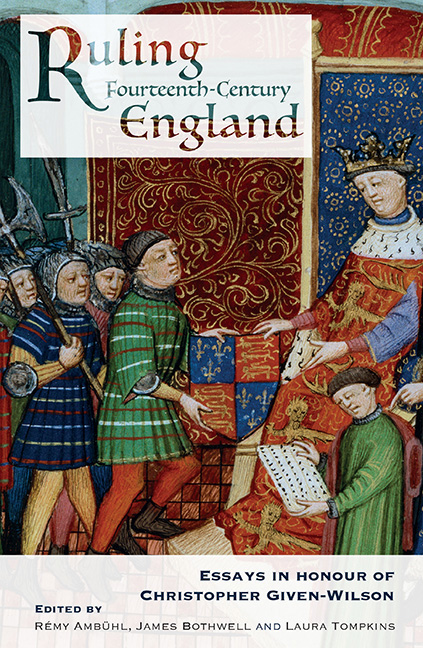Book contents
- Frontmatter
- Contents
- Contributors
- Abbreviations
- Introduction
- The Efficiency of English Royal Administration in the Last Years of Edward I
- Government and Market in the Early Fourteenth Century
- Kings' Clerks: The Essential Tools of Government
- Edward II: Favourites, Loyalty and Kingship
- The Perils of Lordship: The Life and Death of William Tuchet (c. 1275–1322)
- ‘War’, ‘Rebellion’ or ‘Perilous Times’? Political Taxonomy and the Conflict in England, 1321–2
- The Carlisle Roll of Arms and the Political Fabric of Military Service under Edward III
- What's in a Title? Comital Development, Political Pressures and Questions of Purpose in Fourteenth-Century England
- Edward the Black Prince: Lordship and Administration in the Plantagenet Empire
- ‘Said the Mistress to the Bishop’: Alice Perrers, William Wykeham and Court Networks in Fourteenth-Century England
- The Politics of Surrender: Treason, Trials and Recrimination in the 1370s
- Richard II in the Mirror of Christendom
- Bibliography
- Index
- Tabula Gratulatoria
The Efficiency of English Royal Administration in the Last Years of Edward I
Published online by Cambridge University Press: 18 September 2019
- Frontmatter
- Contents
- Contributors
- Abbreviations
- Introduction
- The Efficiency of English Royal Administration in the Last Years of Edward I
- Government and Market in the Early Fourteenth Century
- Kings' Clerks: The Essential Tools of Government
- Edward II: Favourites, Loyalty and Kingship
- The Perils of Lordship: The Life and Death of William Tuchet (c. 1275–1322)
- ‘War’, ‘Rebellion’ or ‘Perilous Times’? Political Taxonomy and the Conflict in England, 1321–2
- The Carlisle Roll of Arms and the Political Fabric of Military Service under Edward III
- What's in a Title? Comital Development, Political Pressures and Questions of Purpose in Fourteenth-Century England
- Edward the Black Prince: Lordship and Administration in the Plantagenet Empire
- ‘Said the Mistress to the Bishop’: Alice Perrers, William Wykeham and Court Networks in Fourteenth-Century England
- The Politics of Surrender: Treason, Trials and Recrimination in the 1370s
- Richard II in the Mirror of Christendom
- Bibliography
- Index
- Tabula Gratulatoria
Summary
Edward I did not have a high opinion of his officials. On his return from Gascony in 1289 he began a major purge of the judiciary, which extended to other officials. In 1295 he dismissed his treasurer, William March, and in 1298 a large-scale inquiry took place into official malfeasance. In his last years, his criticisms, particularly of the exchequer, continued. This paper examines this final period of the reign, which were dominated by the war in Scotland. At this time, according to the great historian of medieval administration, T. F. Tout, ‘an improvised bureaucracy, gradually learning its special business, often did its work badly and was in constant danger of breaking down.’ However, a recent commentator, Caroline Burt, has stressed the ‘concerted and relentless attempt to make government more effective and efficient’ under Edward. She suggests that, by the time of his death, ‘he had arguably settled many of the problems that had arisen in the last decade.’ There can be no doubt that Edward I wanted to make his government more efficient; what is not so evident is how far he managed this.
Many of the king's criticisms were directed at the exchequer. He was clear that many of the problems he faced in Scotland were due to its administrative incompetence, or worse. In the autumn of 1301 he feared that his enterprise there would collapse as a result of the exchequer's failings. He wrote to the officials there on 11 October: ‘Know that we marvel greatly that you have sent us so little money, that you have sent up to now, and specifically that the money that has come has been in such small amounts.’ On 16 October he wrote again. If it had not been for a want of funds, the planned bridge over the Firth of Forth would have been finished. Had he been able to cross, ‘our affairs in these parts would have been brought to a good and honourable end in a short time.’ A further letter from the king, on 22 October, continued his complaints at the fact that no money was forthcoming. He had received ‘no manner of comfort or remedy’.
- Type
- Chapter
- Information
- Ruling Fourteenth-Century EnglandEssays in Honour of Christopher Given-Wilson, pp. 21 - 36Publisher: Boydell & BrewerPrint publication year: 2019



